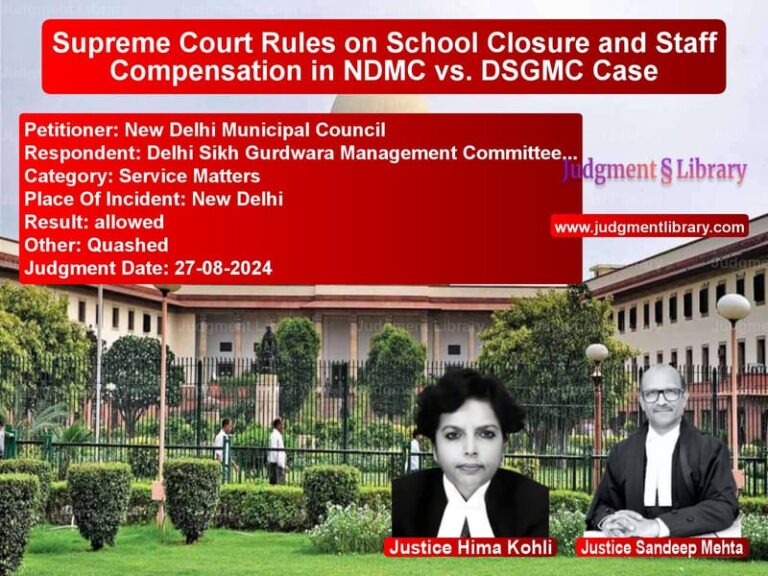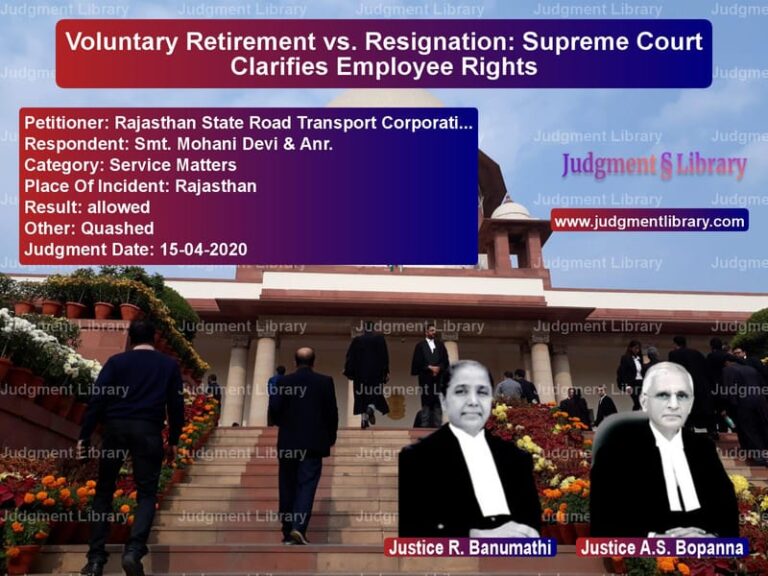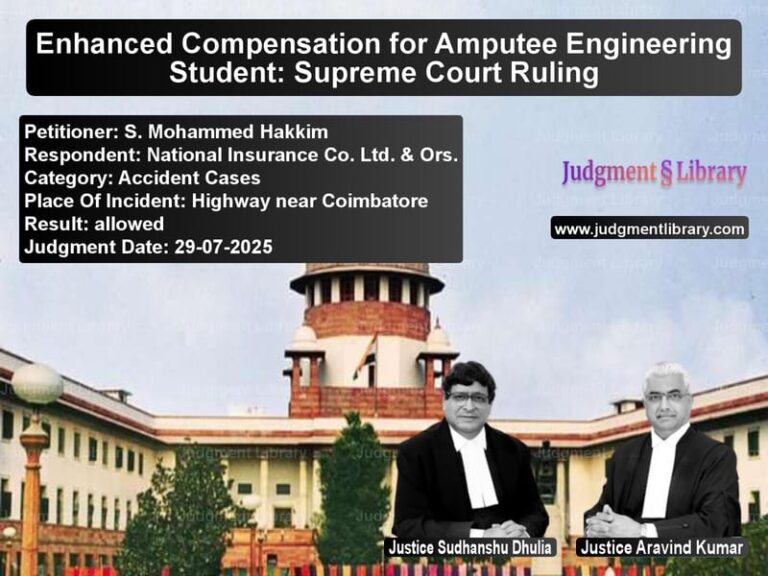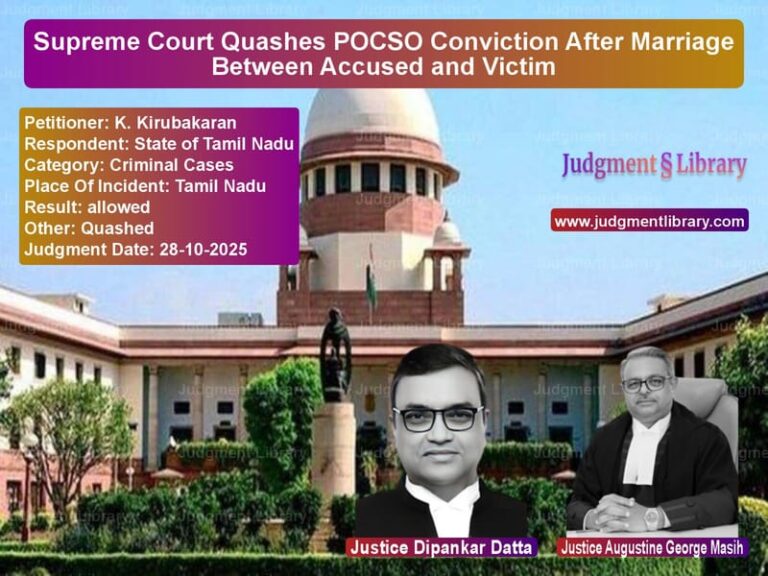Supreme Court Orders Reinstatement and Back Wages for UP Teachers: A Landmark Judgment
The Supreme Court of India, in a significant ruling, has reinstated three Assistant Teachers in a government-aided school in Uttar Pradesh, ordering the payment of back wages and setting aside the High Court’s order that dismissed their claims. The case of Radhey Shyam Yadav & Anr. vs. State of Uttar Pradesh & Ors. underscores the importance of fairness in employment and government accountability in recruitment processes.
Background of the Case
The three appellants, Radhey Shyam Yadav, Lal Chandra Kharwar, and Ravindra Nath Yadav, were appointed as Assistant Teachers in Junior High School, Bahorikpur, Maharajganj, District Jaunpur, Uttar Pradesh on June 25, 1999. Their appointments were duly approved by the District Basic Education Officer, and they worked continuously until October 2005, when their salaries were abruptly stopped without any prior notice.
The teachers approached the Allahabad High Court, filing writ petitions to restore their salaries and recognize their service. The High Court dismissed their petitions, holding that their selection was based on an alleged manipulation of sanctioned posts. The teachers then appealed to the Supreme Court.
Key Legal Issues
- Whether the teachers were legally appointed based on sanctioned vacancies.
- Whether stopping their salaries without prior termination was lawful.
- Whether they were complicit in the alleged manipulation of vacancy numbers.
- Whether they were entitled to reinstatement and back wages.
Arguments by the Petitioners
The petitioners contended:
- They were appointed following a transparent selection process.
- The alleged discrepancy in the sanctioned posts was an internal issue within the school management, and they had no role in it.
- The school management obtained necessary permissions for the selection process, and the state authorities actively participated in the recruitment.
- They had been performing their duties continuously and were denied salaries arbitrarily.
Arguments by the Respondents
The State of Uttar Pradesh argued:
- Only two additional teaching posts were sanctioned in 1997, but the school management fraudulently increased this number to three.
- The selection process was, therefore, invalid, as it was based on unauthorized vacancy creation.
- The recruitment should be considered void due to this misrepresentation.
Supreme Court’s Observations
“There is not an iota of material to demonstrate how the appellants, who were applicants from the open market, were guilty of colluding in the manipulation.”
“The appointments were duly approved, and the teachers discharged their duties for years. No order of termination has been issued. The mere stoppage of salary without formal termination is arbitrary.”
“The Committee of Management and state officials were responsible for the irregularity, yet no action was taken against them. Instead, only the teachers were made to suffer.”
Final Judgment
The Supreme Court ruled:
- The appellants’ appointments were valid as per the approval granted.
- The stoppage of salaries was unjustified.
- The teachers are to be reinstated immediately.
- They are entitled to full back wages from June 25, 1999, to January 2002.
- For the period from October 2005 to the present, they will receive 50% back wages.
- All consequential benefits, including seniority and notional promotions, are to be restored.
- The state is directed to complete these actions within four weeks.
Implications of the Judgment
- Fairness in Public Employment: The ruling ensures that employees cannot be arbitrarily deprived of salaries without formal termination.
- Accountability in Recruitment: The government and school management are held accountable for irregularities rather than punishing innocent appointees.
- Legal Precedent: The judgment reinforces the principle that employees cannot suffer for procedural errors committed by authorities.
Conclusion
The Supreme Court’s decision in Radhey Shyam Yadav & Anr. vs. State of Uttar Pradesh is a major victory for fair employment practices. It underscores that employees must not be penalized for administrative lapses and reaffirms the importance of due process in state recruitments.
Petitioner Name: Radhey Shyam Yadav & Anr..Respondent Name: State of Uttar Pradesh & Ors..Judgment By: Justice J.K. Maheshwari, Justice K.V. Viswanathan.Place Of Incident: Jaunpur, Uttar Pradesh.Judgment Date: 03-01-2024.
Don’t miss out on the full details! Download the complete judgment in PDF format below and gain valuable insights instantly!
Download Judgment: radhey-shyam-yadav-&-vs-state-of-uttar-prade-supreme-court-of-india-judgment-dated-03-01-2024.pdf
Directly Download Judgment: Directly download this Judgment
See all petitions in Employment Disputes
See all petitions in Termination Cases
See all petitions in Public Sector Employees
See all petitions in Judgment by J.K. Maheshwari
See all petitions in Judgment by K.V. Viswanathan
See all petitions in allowed
See all petitions in Remanded
See all petitions in supreme court of India judgments January 2024
See all petitions in 2024 judgments
See all posts in Service Matters Category
See all allowed petitions in Service Matters Category
See all Dismissed petitions in Service Matters Category
See all partially allowed petitions in Service Matters Category







